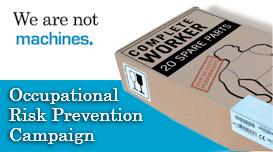Psychosocial Risks
2. Risk Factors of psychosocial origin
In line with what has been stated so far, when an imbalance is produced between the interactions, on the one hand, of work, its environment, job satisfaction and the conditions of the organisation and, on the other, the capabilities of the worker, his or her needs, culture and personal situation outside of work, then a hazard of psychosocial origin appears.
There are many psychosocial factors of risk and, although they are all related to one another, the following classification may be made:
- Task-related factors: the possibility to develop one’s own skills, monotony, repetitiveness, the degree of autonomy, control over work breaks and rhythm, pressure of time (the relation between the amount of work and the time available), interruptions to tasks, emotional work (Contact with users, the public and customers), cognitive work (which requires major intellectual effort), sensorial work ( which requires an effort of the senses ), etc.
- Factors related to the work schedule: the duration and scheduling of the working day, working at night and shift work, formal and informal breaks, etc.
- Factors related to the structure of the organisation: social support by workmates and superiors, the quantity and quality of social relations at work, systems for participating, training and informative practices, control of status (work stability, changes, promotion perspectives, tasks in accordance with qualifications), esteem (respect and recognition), adequate support, being treated fairly, wages, etc.
- Other psychosocial factors: characteristics of the firm and of the post, etc.
What each one of these groups of factors consists in will be explained next.




